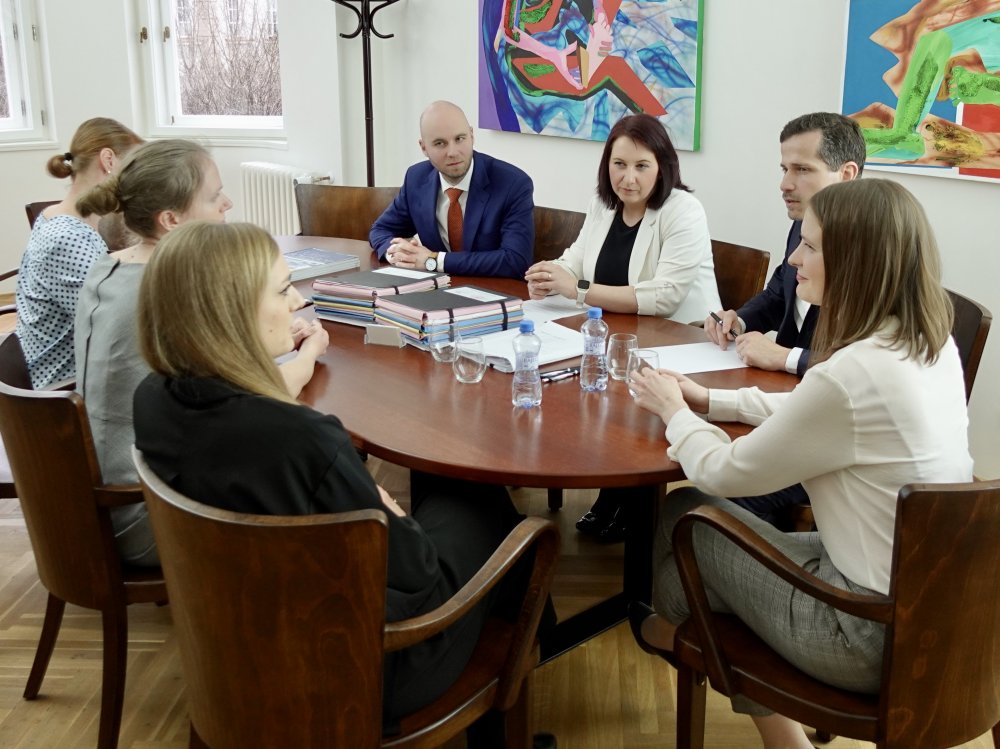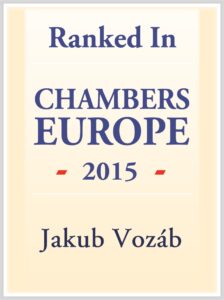
We offer complex external ONLINE solution available anywhere on the Internet
Make whistleblowing part of the company culture
If whistleblowing is already mandatory, let’s make it a company advantage and part of company culture.
Show that you are not afraid of changes and that you want the company to be better, and that the employees themselves can also contribute to this.
Give them the opportunity to become part of the company and support the company’s whistleblowing system.
Why our external services?
We take responsibility for fulfilment of obligations
under the Whistleblowers Protection Act
Sensitive information from notifications remains in hands
of your lawyers, not internal employee
Our lawyers are substitutable so the responsible
person will never be on holiday or sick
Elimination of conflict of interests of the
employer and whistleblowers
Guarantee of confidentiality of whistleblowers’ identity
and prevention of retaliation
Outsourcing increases confidence in the impartiality
of the whistleblowing system

Complex external ONLINE notification system solution
-> Client has a dedicated Whistleblower Software secure reporting channel available online from anywhere on the Internet
-> We takeover performance of the responsible person function including the associated responsibility for fulfilling obligations under the law
Cena služby
Deployment price: 200 EUR excl. VAT flat fee
Service price: from 200 EUR/month excl. VAT + license price
License Price:
0–49 employees – 70 EUR/month excl. VAT
50–249 employees – 80 EUR/month excl. VATH
250–499 employees – 135 EUR/month excl. VAT
500–999 employees – 215 EUR/month excl. VAT
1000–1999 employees – 285 EUR/month excl. VAT
Contact us:
Phone: +420 603 774 473
Email: jakub@vozab.com
References



Trust us:

Email us:
More about the mandatory internal notification system
Responsibility for the deployment and operation of the whistleblowing system
The employer is responsible for the implementation and operation of the notification system. However, in order to fulfill the obligations in processing the submitted notifications within the deadlines set by law, a certain natural person (the so-called “relevant person”) must be authorized, who is then responsible for the fulfillment of his obligations under a fine of up to CZK 100,000, which may be imposed by the Ministry of Justice during an inspection.
Choice of whistleblowing system
Most often, the choice of an electronic solution available online will be offered, which will be more impractical in many ways, whether it is about ensuring the confidentiality of the whistleblower’s identity and all communication with the “relevant person” and the related flow of information and documents within the company, as well as about ensuring transparency and documentation complying with the law’s anti-retaliation requirements, etc.
Due to the requirement of the law for the possibility to submit a notification in writing outside the internal whistleblowing system or even verbally (an audio recording or a written recording is required that faithfully captures the essence of the oral notification, in the case of an audio recording, a written transcript must be subsequently made), in addition to the electronic solution, it is necessary to keep even physical files.
After all, the law requires that the “relevant person” keep an electronic record of the data on the submitted notifications (a sort of overview), but at the same time to keep the notification submitted through the internal notification system and the documents related to the notification for a period of 5 years from the date of receipt of the notification, when it is no longer discussed about the electronic form. Therefore, it will probably be proposed that the “relevant person” keep physical files regarding the notifications submitted, where they will keep all notifications, i.e. both submitted electronically and subsequently printed, as well as submitted in writing or written records or transcripts of audio recordings of notifications submitted orally and, of course, all related documents.
Sharing and outsourcing whistleblowing system
The law allows the internal notification system to be shared with multiple obliged entities if the obliged entity has no more than 249 employees. The conditions for sharing are that each obliged entity must have a separately designated “relevant person” and furthermore the shared system must meet the conditions of Czech legal regulations and must be comprehensible to the notifier, especially when it comes to determining the relevant person, which usually requires localization of the system in the Czech language .
The internal notification system can be outsourced, in which case the limit of 249 employees does not apply, i.e. even large companies with more employees can use this option. It is also possible to use foreign online whistleblowing systems, but this does not affect the liability of the obliged entity for compliance obligations according to the Act. It is therefore necessary to bear in mind the obligation of the “relevant person” to accept the notification in person at the request of the notifier within a reasonable period of time, but no later than 14 days from the date on which the notifier requested it. For this reason, it can be recommended that the “relevant person” be available in the Czech Republic.
Conditions for performing the function of “relevant person”
Integrity is a basic condition. Furthermore, the law imposes a requirement of impartiality on the “relevant person” and stipulates the obligation of confidentiality regarding all facts learned while performing the function. From the principle of the matter, the legal regulation thus forces that the function of “relevant person” is performed by a person who does not risk a conflict of interest between the employer and the whistleblowers. As a rule, this will not be feasible in the case of an internal employee, unless the content of his work is exclusively the performance of the “relevant person” function. This applies all the more if it were to be an employee in a leadership position or an employee of the personnel department, etc. In addition, the question is what if it is an internal employee who performs the function of “relevant person” who wants to file a report?
Avoidance of retaliation
An employer must provide whistleblowers with protection from retaliation, which is any negative consequences as a result of reporting.
It is important to mention that whistleblower protection under the law only applies to those who identify themselves. Thus, it will be common for whistleblowers to state their identity in an attempt to ensure protection, and thus that the “relevant person” will practically always learn the whistleblower’s identity. Therefore, it is really important that the role of “relevant person” for each employer is performed by a person who is not, and cannot potentially be, in a conflict of interest between the employer and the employee/whistleblower.
At the same time, if the company “allows the whistleblower to be subjected to retaliatory measures”, it is possible to impose a fine of up to 1 million CZK. Thus, mere negligence in setting up the system or inappropriate selection of a “relevant person” may, under certain circumstances, result in a company being fined. In addition, the whistleblower can demand payment of non-material damages from the company for the violation of his rights, where the burden of proof is transferred to the employer.
Evidence and archiving obligation of the “relevant person”
Among other things, the relevant person is obliged to keep the notification submitted through the internal notification system and the documents related to the notification for a period of 5 years from the date of receipt of the notification. Of course, so that no one has access to them. At the same time, the question is whether it is possible to secure it within the company, when any safe etc. are owned by the employer.
It should be noted that such documentation on the submitted notification, including the investigation of its justification, will usually contain information and documents that are very sensitive for the employer. In this context, it is good to think about whether it is even appropriate for an internal employee to dispose of such documentation. In other words, whether it is at all appropriate from the point of view of the employer’s interests that the “relevant person” should be an internal employee. His working relationship may end not for good, he may feel wronged, and then there is the question of how to deal with sensitive documents. A situation where the employer will deal with the “relevant person” in breach of duty or even termination of the employment relationship can be quite unpleasant for the employer.
Complex legal services for our clients
For details of our complex legal services for our business clients see ALL FOR BUSINESS section.
Contact us:
Phone: +420 603 774 473
Email: jakub@vozab.com

 Vystudoval Právnickou fakultu University Karlovy v Praze (1997–2002), kde rovněž později obhájil rigorózní práci na téma Ochranná známka Společenství a byl mu udělen titul JUDr. (2006). Následně pokračoval v postgraduálních studiích na Fakultě mezinárodních vztahů Vysoké školy ekonomické v Praze (2005–2012) v oboru Obchodní a mezinárodní hospodářské právo, kde obhájil doktorskou disertační práci na téma Nezapsaná označení zboží a služeb užívaná v obchodě a získal titul Ph.D. (2012). V minulosti pracoval v Advokátní kanceláři Nipl, Žák, Slavíček, Jaroš & spol. jako advokátní koncipient (2002–2005) a následně jako advokát (2005–2011). Od srpna 2011 je řídícím partnerem advokátní kanceláře Vozáb & Co. Právní služby poskytuje v českém a anglickém jazyce a věnuje se zejména obchodnímu právu, právu duševního vlastnictví, zdravotnictví a nemovitostí a vymáhání souvisejících nároků ve sporných řízeních.
Vystudoval Právnickou fakultu University Karlovy v Praze (1997–2002), kde rovněž později obhájil rigorózní práci na téma Ochranná známka Společenství a byl mu udělen titul JUDr. (2006). Následně pokračoval v postgraduálních studiích na Fakultě mezinárodních vztahů Vysoké školy ekonomické v Praze (2005–2012) v oboru Obchodní a mezinárodní hospodářské právo, kde obhájil doktorskou disertační práci na téma Nezapsaná označení zboží a služeb užívaná v obchodě a získal titul Ph.D. (2012). V minulosti pracoval v Advokátní kanceláři Nipl, Žák, Slavíček, Jaroš & spol. jako advokátní koncipient (2002–2005) a následně jako advokát (2005–2011). Od srpna 2011 je řídícím partnerem advokátní kanceláře Vozáb & Co. Právní služby poskytuje v českém a anglickém jazyce a věnuje se zejména obchodnímu právu, právu duševního vlastnictví, zdravotnictví a nemovitostí a vymáhání souvisejících nároků ve sporných řízeních.



 Vyštudoval Právnickú fakultu Masarykovej univerzity v Brne (2008–2013), kde v priebehu štúdia absolvoval niekoľko stáží (august 2009 – august 2012). Po ukončení štúdia pracoval ako advokátsky koncipient spolupracujúci s advokátskou kanceláriou JUDr. Miroslava Tyrnera (2013–2017) a s advokátskou kanceláriou Vozáb & Co.(2016–2017), kde od augusta 2017 pôsobí ako trvalo spolupracujúci advokát. Právne služby poskytuje v slovenskom, českom a anglickom jazyku. Venuje sa najmä obchodnému právu, občianskemu právu, oblasti e-commerce a vymáhaniu súvisiacich nárokov.
Vyštudoval Právnickú fakultu Masarykovej univerzity v Brne (2008–2013), kde v priebehu štúdia absolvoval niekoľko stáží (august 2009 – august 2012). Po ukončení štúdia pracoval ako advokátsky koncipient spolupracujúci s advokátskou kanceláriou JUDr. Miroslava Tyrnera (2013–2017) a s advokátskou kanceláriou Vozáb & Co.(2016–2017), kde od augusta 2017 pôsobí ako trvalo spolupracujúci advokát. Právne služby poskytuje v slovenskom, českom a anglickom jazyku. Venuje sa najmä obchodnému právu, občianskemu právu, oblasti e-commerce a vymáhaniu súvisiacich nárokov. Vystudovala Obchodní akademii (1990–1994) a po ukončení studií pracovala pro takové společnosti jako 3M ČESKO (1999–2001), PHILIPS Česká republika (2001–2004), iGATE (2012–2018) a JOKA AUDIT (2018–2022). V roce 2022 nastoupila do advokátní kanceláře Vozáb & Co. na pozici asistentky. Markéta hovoří česky a anglicky a má na starosti kompletní administrativní zázemí kanceláře.
Vystudovala Obchodní akademii (1990–1994) a po ukončení studií pracovala pro takové společnosti jako 3M ČESKO (1999–2001), PHILIPS Česká republika (2001–2004), iGATE (2012–2018) a JOKA AUDIT (2018–2022). V roce 2022 nastoupila do advokátní kanceláře Vozáb & Co. na pozici asistentky. Markéta hovoří česky a anglicky a má na starosti kompletní administrativní zázemí kanceláře. Vystudovala Provozně-ekonomickou fakultu Mendelovy univerzity v Brně (2007–2011), přičemž v rámci studií získala pracovní zkušenosti výkonem pomocných účetních a administrativních prací pro Novoměstské sociální služby – Nové Město na Moravě. Po ukončení studií nastoupila do advokátní kanceláře Vozáb & Co. na pozici asistentky. Lenka hovoří česky a anglicky a má na starosti kompletní administrativní zázemí kanceláře.
Vystudovala Provozně-ekonomickou fakultu Mendelovy univerzity v Brně (2007–2011), přičemž v rámci studií získala pracovní zkušenosti výkonem pomocných účetních a administrativních prací pro Novoměstské sociální služby – Nové Město na Moravě. Po ukončení studií nastoupila do advokátní kanceláře Vozáb & Co. na pozici asistentky. Lenka hovoří česky a anglicky a má na starosti kompletní administrativní zázemí kanceláře. Vystudoval Vysokou školu ekonomickou v Praze (1995–2000) a Právnickou fakultu University Karlovy v Praze (2005–2010), kde rovněž později obhájil rigorózní práci na téma Územní plánování obcí a jeho vliv na životní prostředí a byl mu udělen titul JUDr. (2015). Dále získal členství v celosvětové organizaci Association of Chartered Certified Accountants (ACCA) udělující titul FCCA a složil zkoušky v oblasti řízení podniku a finančního výkaznictví pro mezinárodní účetní standardy (2000–2004). V minulosti pracoval v oddělení auditu pro Arthur Andersen (2000–2004), Ernst & Young (2002–2004) a jako finanční ředitel společnosti Canon (2004–2005). Od roku 2005 pracuje jako daňový poradce a advokát a trvale spolupracuje s advokátní kanceláří Vozáb & Co. Daňové poradenství a právní služby poskytuje v českém a anglickém jazyce a kromě oblasti daní a účetnictví se věnuje zejména obchodnímu právu, právu nemovitostí, stavebnímu právu a zastupování v řízení podle stavebního zákona.
Vystudoval Vysokou školu ekonomickou v Praze (1995–2000) a Právnickou fakultu University Karlovy v Praze (2005–2010), kde rovněž později obhájil rigorózní práci na téma Územní plánování obcí a jeho vliv na životní prostředí a byl mu udělen titul JUDr. (2015). Dále získal členství v celosvětové organizaci Association of Chartered Certified Accountants (ACCA) udělující titul FCCA a složil zkoušky v oblasti řízení podniku a finančního výkaznictví pro mezinárodní účetní standardy (2000–2004). V minulosti pracoval v oddělení auditu pro Arthur Andersen (2000–2004), Ernst & Young (2002–2004) a jako finanční ředitel společnosti Canon (2004–2005). Od roku 2005 pracuje jako daňový poradce a advokát a trvale spolupracuje s advokátní kanceláří Vozáb & Co. Daňové poradenství a právní služby poskytuje v českém a anglickém jazyce a kromě oblasti daní a účetnictví se věnuje zejména obchodnímu právu, právu nemovitostí, stavebnímu právu a zastupování v řízení podle stavebního zákona. Vystudovala Právnickou fakultu Masarykovy University v Brně (2010–2015), kde v průběhu studia absolvovala praxi v několika advokátních kancelářích a také u Okresního soudu ve Vsetíně (2014). Po ukončení studií nastoupila do advokátní kanceláře Vozáb & Co., kde v minulosti pracovala jako advokátní koncipientka (2015–2019) a kde od července 2019 působí jako trvale spolupracující advokátka. Právní služby poskytuje v českém a anglickém jazyce a věnuje se zejména obchodnímu právu, právu nemovitostí a vymáhání souvisejících nároků.
Vystudovala Právnickou fakultu Masarykovy University v Brně (2010–2015), kde v průběhu studia absolvovala praxi v několika advokátních kancelářích a také u Okresního soudu ve Vsetíně (2014). Po ukončení studií nastoupila do advokátní kanceláře Vozáb & Co., kde v minulosti pracovala jako advokátní koncipientka (2015–2019) a kde od července 2019 působí jako trvale spolupracující advokátka. Právní služby poskytuje v českém a anglickém jazyce a věnuje se zejména obchodnímu právu, právu nemovitostí a vymáhání souvisejících nároků. Vystudoval Právnickou fakultu University Karlovy v Praze (2007–2013), kde v průběhu studia absolvoval praxi u Exekutorského úřadu pro Prahu 3 (březen 2010 – srpen 2011). Po ukončení studií nastoupil do advokátní kanceláře Vozáb & Co., kde v minulosti pracoval jako advokátní koncipient (2013–2016) a kde od října 2016 působí jako trvale spolupracující advokát. Právní služby poskytuje v českém a anglickém jazyce a věnuje se zejména obchodnímu právu, právu nemovitostí a vymáhání souvisejících nároků.
Vystudoval Právnickou fakultu University Karlovy v Praze (2007–2013), kde v průběhu studia absolvoval praxi u Exekutorského úřadu pro Prahu 3 (březen 2010 – srpen 2011). Po ukončení studií nastoupil do advokátní kanceláře Vozáb & Co., kde v minulosti pracoval jako advokátní koncipient (2013–2016) a kde od října 2016 působí jako trvale spolupracující advokát. Právní služby poskytuje v českém a anglickém jazyce a věnuje se zejména obchodnímu právu, právu nemovitostí a vymáhání souvisejících nároků. Vystudovala Právnickou fakultu University Karlovy v Praze (2003–2008), kde absolvovala studijní stáž na civilněprávním a trestněprávním úseku Obvodního Soudu pro Prahu 5 (září 2006 – květen 2007). Ve studiích pokračovala ve Velké Británii, kde vystudovala obor International and European Law na University of Aberdeen (2010–2011) a byl jí udělen titul LL.M. Po ukončení studií nastoupila do advokátní kanceláře Vozáb & Co., kde v minulosti pracovala jako advokátní koncipientka (2011–2015) a kde od října 2015 působí jako trvale spolupracující advokátka. V rámci postgraduálního studia na Právnické fakultě University Karlovy v Praze obhájila rigorózní práci v oblasti mezinárodního práva soukromého a byl jí udělen titul JUDr. (2014). Právní služby poskytuje v českém, anglickém, slovenském a polském jazyce a věnuje se zejména obchodnímu právu, pracovnímu právu a dále oblasti nemovitostí.
Vystudovala Právnickou fakultu University Karlovy v Praze (2003–2008), kde absolvovala studijní stáž na civilněprávním a trestněprávním úseku Obvodního Soudu pro Prahu 5 (září 2006 – květen 2007). Ve studiích pokračovala ve Velké Británii, kde vystudovala obor International and European Law na University of Aberdeen (2010–2011) a byl jí udělen titul LL.M. Po ukončení studií nastoupila do advokátní kanceláře Vozáb & Co., kde v minulosti pracovala jako advokátní koncipientka (2011–2015) a kde od října 2015 působí jako trvale spolupracující advokátka. V rámci postgraduálního studia na Právnické fakultě University Karlovy v Praze obhájila rigorózní práci v oblasti mezinárodního práva soukromého a byl jí udělen titul JUDr. (2014). Právní služby poskytuje v českém, anglickém, slovenském a polském jazyce a věnuje se zejména obchodnímu právu, pracovnímu právu a dále oblasti nemovitostí. Vystudovala Právnickou fakultu University Karlovy v Praze (2005–2011), kde absolvovala studijní stáž na právnické fakultě Universidad de Zaragoza, Španělsko (2009–2010) a studijní stáž na občanskoprávním úseku Obvodního soudu pro Prahu 9 (březen – květen 2009). Po ukončení studií nastoupila do advokátní kanceláře Vozáb & Co., kde v minulosti pracovala jako advokátní koncipient (2011–2015) a kde od března 2015 působí jako trvale spolupracující advokátka. V rámci postgraduálního studia na Právnické fakultě University Karlovy v Praze obhájila rigorózní práci na téma předběžná opatření soudu a byl jí udělen titul JUDr. (2016). Právní služby poskytuje v českém, anglickém a španělském jazyce a věnuje se zejména obchodnímu a pracovnímu právu a dále oblasti duševního vlastnictví a vymáhání souvisejících nároků.
Vystudovala Právnickou fakultu University Karlovy v Praze (2005–2011), kde absolvovala studijní stáž na právnické fakultě Universidad de Zaragoza, Španělsko (2009–2010) a studijní stáž na občanskoprávním úseku Obvodního soudu pro Prahu 9 (březen – květen 2009). Po ukončení studií nastoupila do advokátní kanceláře Vozáb & Co., kde v minulosti pracovala jako advokátní koncipient (2011–2015) a kde od března 2015 působí jako trvale spolupracující advokátka. V rámci postgraduálního studia na Právnické fakultě University Karlovy v Praze obhájila rigorózní práci na téma předběžná opatření soudu a byl jí udělen titul JUDr. (2016). Právní služby poskytuje v českém, anglickém a španělském jazyce a věnuje se zejména obchodnímu a pracovnímu právu a dále oblasti duševního vlastnictví a vymáhání souvisejících nároků.